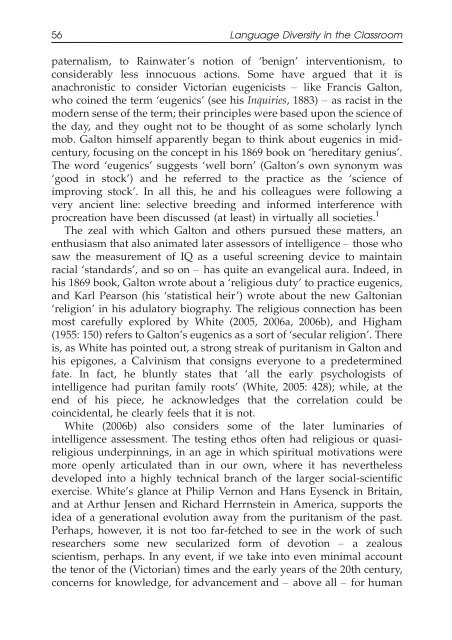Language Diversity in the Classroom - ymerleksi - home
Language Diversity in the Classroom - ymerleksi - home
Language Diversity in the Classroom - ymerleksi - home
- No tags were found...
You also want an ePaper? Increase the reach of your titles
YUMPU automatically turns print PDFs into web optimized ePapers that Google loves.
56 <strong>Language</strong> <strong>Diversity</strong> <strong>in</strong> <strong>the</strong> <strong>Classroom</strong>paternalism, to Ra<strong>in</strong>water’s notion of ‘benign’ <strong>in</strong>terventionism, toconsiderably less <strong>in</strong>nocuous actions. Some have argued that it isanachronistic to consider Victorian eugenicists like Francis Galton,who co<strong>in</strong>ed <strong>the</strong> term ‘eugenics’ (see his Inquiries, 1883) as racist <strong>in</strong> <strong>the</strong>modern sense of <strong>the</strong> term; <strong>the</strong>ir pr<strong>in</strong>ciples were based upon <strong>the</strong> science of<strong>the</strong> day, and <strong>the</strong>y ought not to be thought of as some scholarly lynchmob. Galton himself apparently began to th<strong>in</strong>k about eugenics <strong>in</strong> midcentury,focus<strong>in</strong>g on <strong>the</strong> concept <strong>in</strong> his 1869 book on ‘hereditary genius’.The word ‘eugenics’ suggests ‘well born’ (Galton’s own synonym was‘good <strong>in</strong> stock’) and he referred to <strong>the</strong> practice as <strong>the</strong> ‘science ofimprov<strong>in</strong>g stock’. In all this, he and his colleagues were follow<strong>in</strong>g avery ancient l<strong>in</strong>e: selective breed<strong>in</strong>g and <strong>in</strong>formed <strong>in</strong>terference withprocreation have been discussed (at least) <strong>in</strong> virtually all societies. 1The zeal with which Galton and o<strong>the</strong>rs pursued <strong>the</strong>se matters, anenthusiasm that also animated later assessors of <strong>in</strong>telligence those whosaw <strong>the</strong> measurement of IQ as a useful screen<strong>in</strong>g device to ma<strong>in</strong>ta<strong>in</strong>racial ‘standards’, and so on has quite an evangelical aura. Indeed, <strong>in</strong>his 1869 book, Galton wrote about a ‘religious duty’ to practice eugenics,and Karl Pearson (his ‘statistical heir’) wrote about <strong>the</strong> new Galtonian‘religion’ <strong>in</strong> his adulatory biography. The religious connection has beenmost carefully explored by White (2005, 2006a, 2006b), and Higham(1955: 150) refers to Galton’s eugenics as a sort of ‘secular religion’. Thereis, as White has po<strong>in</strong>ted out, a strong streak of puritanism <strong>in</strong> Galton andhis epigones, a Calv<strong>in</strong>ism that consigns everyone to a predeterm<strong>in</strong>edfate. In fact, he bluntly states that ‘all <strong>the</strong> early psychologists of<strong>in</strong>telligence had puritan family roots’ (White, 2005: 428); while, at <strong>the</strong>end of his piece, he acknowledges that <strong>the</strong> correlation could beco<strong>in</strong>cidental, he clearly feels that it is not.White (2006b) also considers some of <strong>the</strong> later lum<strong>in</strong>aries of<strong>in</strong>telligence assessment. The test<strong>in</strong>g ethos often had religious or quasireligiousunderp<strong>in</strong>n<strong>in</strong>gs, <strong>in</strong> an age <strong>in</strong> which spiritual motivations weremore openly articulated than <strong>in</strong> our own, where it has never<strong>the</strong>lessdeveloped <strong>in</strong>to a highly technical branch of <strong>the</strong> larger social-scientificexercise. White’s glance at Philip Vernon and Hans Eysenck <strong>in</strong> Brita<strong>in</strong>,and at Arthur Jensen and Richard Herrnste<strong>in</strong> <strong>in</strong> America, supports <strong>the</strong>idea of a generational evolution away from <strong>the</strong> puritanism of <strong>the</strong> past.Perhaps, however, it is not too far-fetched to see <strong>in</strong> <strong>the</strong> work of suchresearchers some new secularized form of devotion a zealousscientism, perhaps. In any event, if we take <strong>in</strong>to even m<strong>in</strong>imal account<strong>the</strong> tenor of <strong>the</strong> (Victorian) times and <strong>the</strong> early years of <strong>the</strong> 20th century,concerns for knowledge, for advancement and above all for human
















